UMass Lowell health sciences students volunteer at Lowell Vaccine Clinic
Nursing students get clinical hours for giving COVID-19 vaccinations
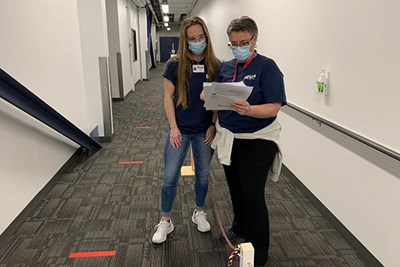
The day that public health major Jordan Lippincott got an email asking for volunteers to help staff Lowell General Hospital’s COVID-19 mass vaccination clinic, she signed up.
Over the next few days, more than 100 students in the Zuckerberg College of Health Sciences did the same, hungry for hands-on experience – and eager to help the community get vaccinated.
Within a week, Lippincott had attended training and orientation, and a week after that, she was assisting at the mass vaccination site at 1001 Pawtucket Blvd., where about 2,000 people a day are getting shots.
Now Lippincott volunteers every Saturday from 7 a.m. to 3:30 p.m., helping wherever she’s asked – at check-in, as an usher, as a runner who makes sure the nurses have everything they need, or as a monitor in the observation area where people wait after getting the vaccine in case they have an acute adverse reaction.
Lippincott chats with patients, answers their questions and tries to put them at ease – all while learning a tremendous amount about public health.
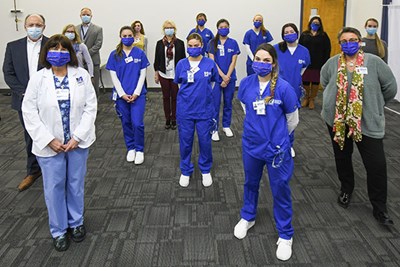
“I actually look forward to going there at 7 a.m. on a Saturday,” she says, laughing. “The operations are wonderful there. Everything’s one way, everything flows, and Lowell General takes care of everyone – the patients, the staff and the volunteers. This experience confirms how much I really love public health.”
A total of 130 UMass Lowell students, faculty, staff and alumni have signed up to volunteer at the Lowell General Hospital mass vaccination site, a building with a large parking lot that’s being donated by Farley White Investments. Most of the students are in the Zuckerberg College, but some forwarded the sign-up email to their friends in other colleges, who volunteered, too, says Associate Dean Nicole Champagne.
In addition, junior year nursing students are getting clinical hours by running one of the vaccination stations, supervised by clinical faculty. They ask questions about each patient’s health and allergies, document their responses, fill out vaccination cards, make follow-up appointments for the two-dose vaccines – and give the shots.
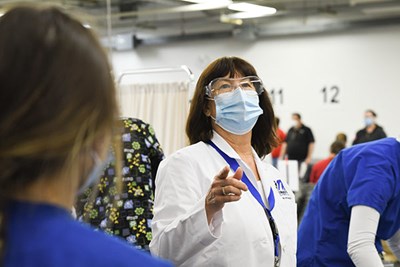
“Once they get over the fear of actually giving the vaccine, I’ve watched the students all just grow in the communication and interaction they’re having with the people who are coming in,” says Clinical Instructor Diana McAuliffe. “That’s the best part of this experience.”
Nursing student Nancy Pin says she was happy to work with live patients after a year of clinical experiences largely limited by the pandemic to the simulation lab or videoconferencing with actors. She was nervous when she had to give her first shot, but the patients were so happy to be getting vaccinated that she quickly gained confidence.
“For some people, it was their first dose of the vaccine, and it was a very emotional moment for them, and to be able to share that moment with them was very rewarding,” Pin says. “Some patients were dancing, some patients were crying – they were amazing. They were very excited, all of them.”
Pin had a special patient, too, among those who came through on a recent Thursday: Champagne, who volunteers at the site on Saturdays.
“I was very, very honored to give her her first COVID vaccine, because she’ll remember me,” says Pin, who was just accepted to the master’s degree program for family nurse practitioners.
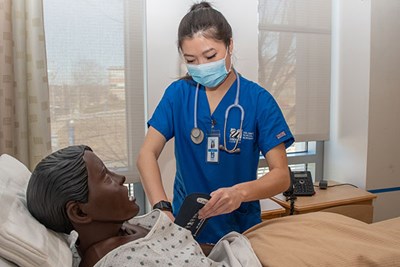
The Zuckerberg College’s partnership with Lowell General Hospital is a longstanding one, says Dean Shortie McKinney, so when the hospital said it would be setting up a mass vaccination program, she called Chief Operating Officer Amy Hoey ’88 to see how the university could help.
“They support our students’ clinical experiences, and we very much appreciate everything they do for our students every year,” McKinney says.
McKinney worked with the hospital’s special events coordinator, Kacey Decker, and the university’s Office of Community Relations to create an online sign-up form where volunteers could enter the days and hours they are available.
Then McKinney sent out an email to alumni, faculty and staff, while Champagne sent an email to students, soliciting volunteers. The response was overwhelming.
“It’s been tremendous, way beyond what I expected. The students have been so generous with their time, and I know how busy they are,” McKinney says. “It just really reflects how they want to give back, how they want to help others. And they’re seeing how all of the different disciplines are working together to make the vaccine campaign go smoothly.”
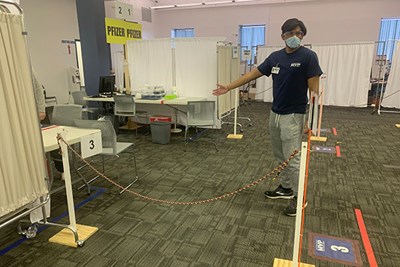
Decker says the UMass Lowell volunteers have been a great asset.
“With the students, we have come to rely on them,” she says. “Every single one is prompt, ready to work and will do whatever needs to be done. And they’re incredibly kind and professional with our patients.”
Although she can’t yet use all of the UML volunteers who signed up, more will be called in to help as the vaccine supply increases, she says.
“I love working with the students. They are so eager to help and are really making a difference,” she says. “I hope they’ll be with us through to the end.”
Lippincott plans to keep volunteering. She says that being part of such a massive community health campaign in response to the pandemic is a once-in-a-lifetime opportunity – one that she will never forget.
“It’s really motivating and such a rewarding feeling, knowing how many people we’re helping,” she says. “I’ll tell my kids and my grandkids about this one day.”